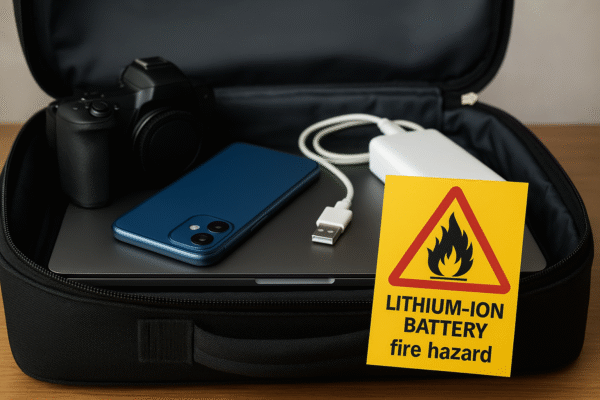On September 9, 2025, the Federal Aviation Administration (FAA) released an urgent Safety Alert for Operators (SAFO), warning the aviation industry about the escalating dangers posed by lithium batteries carried by passengers and crew. The document highlights how these common power sources—found in laptops, tablets, smartphones, and portable chargers—can overheat, leading to smoke, fire, or even explosions inside an aircraft cabin.
The FAA emphasized that lithium batteries, especially when stored in carry-on luggage, present a heightened risk because of their ability to enter a “thermal runaway” state. This chemical reaction can cause a rapid increase in temperature, sometimes resulting in uncontrollable fires. With modern travel now reliant on electronic devices, this alert serves as a critical reminder for both airlines and passengers to take additional precautions.
Why Lithium Batteries Pose Such a Threat
Lithium-ion batteries are widely used because they are lightweight, rechargeable, and powerful. However, these same qualities make them vulnerable to overheating under certain conditions. When damaged, overcharged, or exposed to heat, a battery cell can short-circuit, releasing energy so quickly that it ignites.
The FAA has cautioned that traditional onboard fire suppression systems, such as Halon extinguishers, cannot fully stop this process. While Halon may suppress visible flames, it cannot halt the underlying chemical reaction. Instead, the FAA now recommends large amounts of water as the most effective way to cool overheating batteries and slow thermal runaway.
This guidance follows several demonstrations, including a recent FAA test where a battery pack ignited in a seat-back pocket. The incident underscored how even small devices—such as power banks or e-cigarettes—can become serious hazards in confined aircraft cabins.
Airlines Respond with New Safety Measures
Airlines worldwide are revisiting their safety policies in light of the FAA’s warning. Southwest Airlines, for instance, has introduced rules requiring passengers to keep portable chargers and power banks visible during use. The aim is to ensure crew members can quickly respond if a device begins to overheat.
Other carriers are going further with restrictions. Emirates announced that, starting October 1, 2025, passengers will only be permitted to carry one power bank with a maximum capacity of 100 watt-hours. Furthermore, the power bank must remain switched off for the entire flight. Such measures aim to reduce the risk of concealed overheating in bags or seat compartments.
In China, regulators have already moved to ban uncertified power banks on domestic flights. Earlier this year, thousands of non-compliant devices were confiscated at airports nationwide. These policies align with a growing international effort to curb lithium battery incidents in aviation.
Rising Incidents with Electronic Devices
The FAA’s safety alert is not an isolated warning. Over the past decade, the number of reported lithium battery-related incidents on aircraft has steadily increased. From overheating laptops to portable chargers catching fire, these events highlight the mounting pressure airlines face to address evolving safety challenges.
Modern air travel has seen passengers carrying multiple electronic devices—phones, tablets, headphones, gaming systems, and even smart accessories. Each additional device adds to the cumulative risk. Crew members are now being trained more rigorously to identify signs of overheating and respond swiftly with fire-resistant containment bags, water, or other approved methods.
What Passengers Should Know
The FAA is encouraging travelers to take responsibility for their own safety when flying with electronic devices. Passengers are advised to:
- Avoid packing spare lithium batteries in checked baggage.
- Keep devices in accessible locations where overheating can be spotted quickly.
- Refrain from charging devices that feel hot or appear damaged.
- Follow airline-specific restrictions on power banks and chargers.
By staying alert and cooperating with airline rules, passengers can play a direct role in preventing dangerous in-flight incidents.
Global Implications for Air Travel
As aviation authorities and airlines continue to adapt, it is clear that lithium battery safety is becoming a priority on a global scale. The FAA’s latest alert is expected to influence regulatory changes beyond U.S. borders, prompting more countries to enforce stricter standards.
With international air traffic increasing and more travelers relying on personal electronics, experts predict that additional airlines will adopt measures similar to Emirates and Southwest. These steps, combined with technological improvements in battery design, may eventually reduce the risks. However, until then, the cooperation of passengers, flight crews, and regulators remains essential.
A Call for Continuous Awareness
The FAA’s September 2025 safety alert is not only a technical directive but also a reminder of the evolving nature of air travel safety. As reliance on portable electronics continues to grow, so too does the need for heightened vigilance.
For passengers, the message is clear: be mindful of the devices you carry, follow airline instructions carefully, and understand that even a small power bank can pose a significant danger. For airlines and aviation authorities, the task is to stay ahead of emerging risks, update safety protocols, and ensure crews are fully prepared to act in emergencies.
Ultimately, the collective effort of regulators, airlines, and travelers will determine how effectively the aviation industry can prevent lithium battery incidents. In the words of the FAA, ongoing awareness and proactive measures are the most powerful tools to safeguard the skies.
For more travel news like this, keep reading Global Travel Wire
















